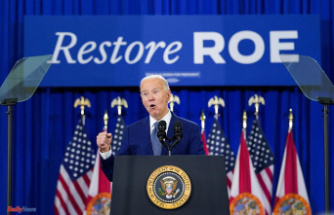Several federal ministries and their associated authorities have a lot of catching up to do when it comes to saving energy. This emerges from a current list by the Ministry of Economic Affairs and Climate Protection, which is available to WELT AM SONNTAG.
According to this, some departments in their buildings do not yet or only partially meet the standards recently specified by the federal government. This is not about concrete savings targets, but about the implementation of a package of measures.
The list is an inventory based on energy-saving guidelines with immediate measures that the Ministry of Economic Affairs sent to the departments on June 21. The specifications are based on a sustainability program that was approved in August of last year.
Among other things, electrical appliances are to be used less, non-safety-relevant lighting is to be switched off, the cooling of the premises and the hot water preparation are to be reduced and the heating systems are to be readjusted.
According to the report, the Ministry of Agriculture and the Interior are still examining whether and how the number of electrical devices can be reduced. The justice and labor ministries are only in the planning phase, the family and education ministries as well as the foreign office indicate at least partial implementation. According to the report, switching off unnecessary lamps is only "under consideration" in the Ministry of the Interior, "in planning" in the Foreign Office and "partially implemented" in the Ministry of Labor.
The Ministry of the Interior is also only in the testing phase when it comes to throttling the air conditioning systems, as is the Ministry of Agriculture. The Ministry of Justice is at least planning appropriate measures, and the Ministry of Labor has taken the first steps. Economics Minister Robert Habeck (Greens) has already decreed that offices may be cooled to a maximum of 26 degrees.
The Federal Network Agency, which is part of his portfolio, reports partial implementation. In some ministries, however, it is still common to cool rooms to 20 to 22 degrees. The Ministry of the Interior is also lagging behind when it comes to readjusting the heating systems, they are still checking.
The Ministry of Education is planning measures, and the Ministries of Health, Justice and Labor have made some progress here. In several resorts, hot water flows as before, so the reduction in costs is by no means complete.
The list has now been presented by the Ministry of Economics at the request of the Union faction in the Bundestag in view of the impending gas supply stop by Russia. In a first assessment, CDU climate politician Thomas Gebhart criticizes: “There is a risk of an energy emergency. It would be easy for the ministries to immediately implement measures to save energy in their own homes.”
The government has a role model function, said the member of the Bundestag this newspaper. "You can't ask citizens and industry to save energy - which I expressly welcome - and then at the same time only make progress at a snail's pace with your own properties."
The co-head of the German Environmental Aid, Sascha Müller-Kraenner, also warns the administration to hurry: "We must not start saving energy in winter, that also applies to the federal government." He regrets: "Many private households have invested significantly recently, to be able to supply themselves on the basis of renewable energies. Ministries and authorities often lag behind.” The President of the Taxpayers’ Association, Reiner Holznagel, says: “Anyone who demands that citizens make efforts to save energy must also do it themselves.”
The Federal Ministry of the Interior (BMI) points out that the house is dependent on the cooperation with the landlord of the property, the Federal Agency for Real Estate Tasks, when it comes to energy-saving measures. "The BMI has little influence on how quickly this cooperation is provided," says a spokeswoman.
In addition, the picture for the implementation of the energy saving measures would only show a short period of time. The Environment and Defense Ministries are proving that things can go faster. In the latter there has been an energy saving campaign called "Mission E" for some time.












